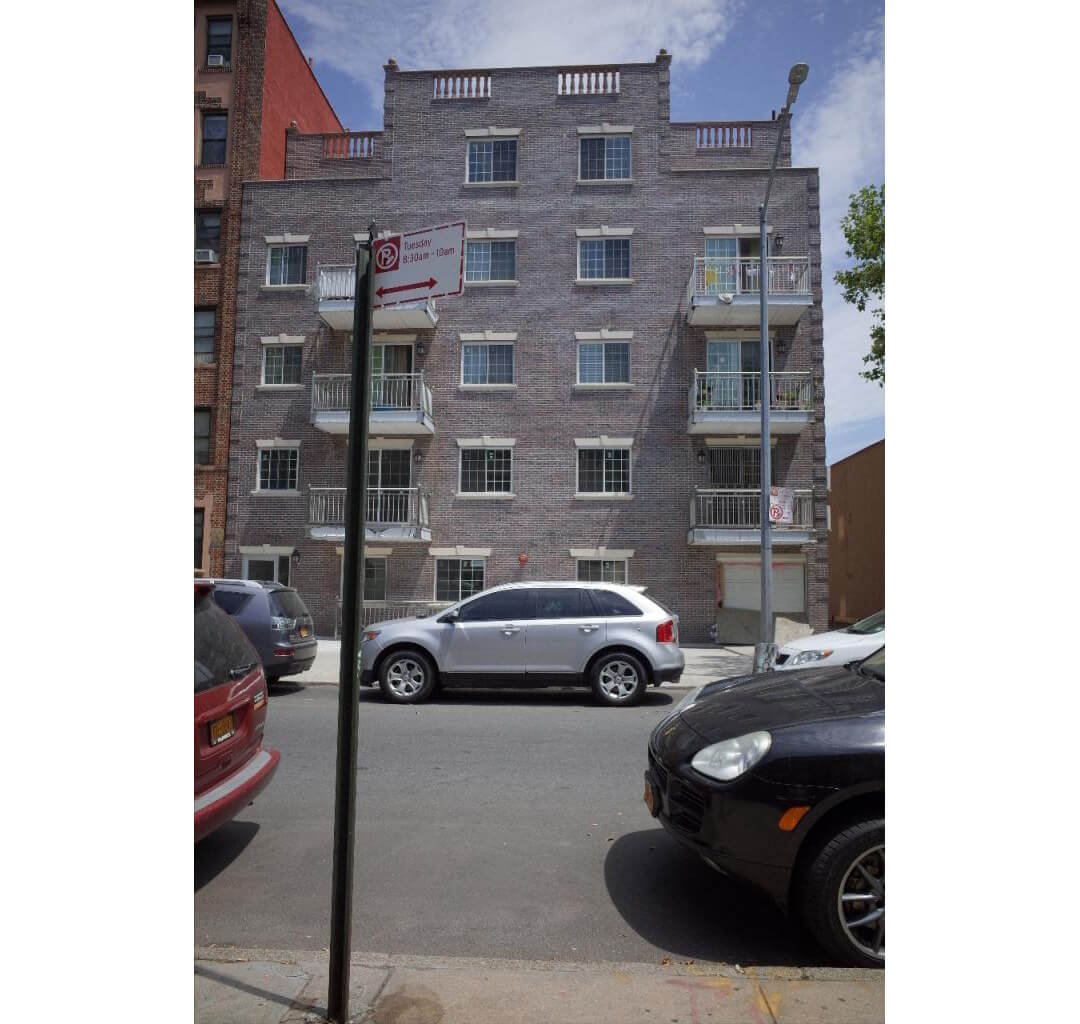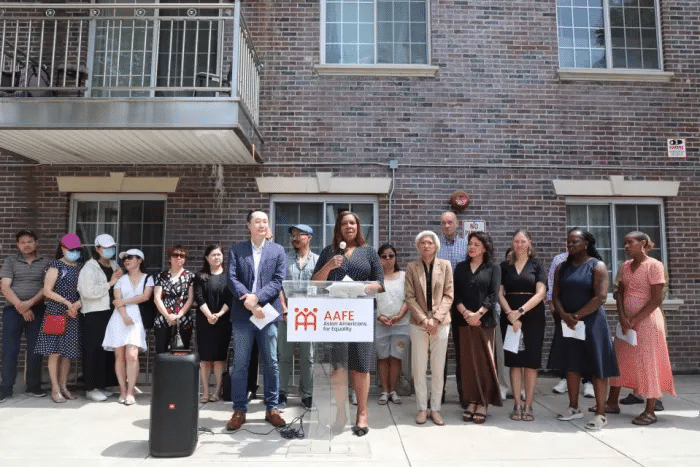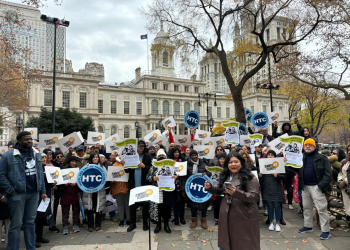Homeownership a Possibility for Immigrant Families Who Sued Bay Ridge Landlord
A group of immigrant families who faced eviction after being defrauded by their landlord are now on the path to homeownership after a nonprofit stepped in to purchase the building.

The residents of 345 Ovington Ave. in Bay Ridge celebrated Wednesday after their building was sold to Asian Americans for Equality — forging their path to homeownership. Photo by Adam Daly
By Adam Daly, Brooklyn Paper
A group of 20 immigrant families who faced eviction after being defrauded of millions of dollars by their landlord are now on the path to homeownership after a nonprofit affordable housing developer stepped in to purchase the building.
Residents of 345 Ovington Avenue paid over $5 million to developer Xi Hui Steven Wu for Bay Ridge condominiums, only to later discover that Wu lacked state permission for the sales and never transferred the deeds.
As Wu was also not paying the mortgage and still owed more than $5 million as of October 2018, his lender, Maxim Credit Group, started foreclosure proceedings on the building, leaving residents in jeopardy.
Kris Chan was a teenager when she moved into Ovington Avenue with her mother and two siblings in 2016. To live in the building, the Chan family and other tenants were paying monthly condo fees on top of the massive sums they had paid in down payments for their units — up to $500,000 in some cases.
“Initially my mom wanted to purchase this apartment because of the local community and the school zone but in 2017 we received some correspondence from a bank that made us think there was something wrong financially,” Chan told Brooklyn Paper on Wednesday, adding that after an initial meeting with Wu about the issue, residents decided to enlist the help of an attorney who warned them that they may be victims of fraud.
“We were devastated and felt helpless and overwhelmed when we learned what happened,” she said.

Another resident, Rei Tan, purchased an apartment for his elderly parents. “We wanted them to be close by here in Bay Ridge. For so long, it felt like a hopeless situation with nowhere to turn for help,” he said.
In 2021, after a protracted legal battle, the residents won a lawsuit against Wu but continued to face foreclosure threats. In July 2022, Chan and two other tenants filed an involuntary bankruptcy claim against Wu’s LLC, halting the sale of the building and allowing time to negotiate a solution.
The tenants publicized their case through local elected officials, leading to a partnership with the nonprofit Asian Americans for Equality (AAFE). In collaboration with the residents’ attorney, Ed Cuccia, and the court trustee, AAFE staff began meeting with the families and hatched a plan to first purchase the mortgage note to prevent foreclosure and then start the lengthy process of converting 345 Ovington Avenue to a limited equity cooperative.
Last month, AAFE, with support from New York Homes and Community Renewal and the New York City Department of Housing Preservation and Development, finalized the building’s purchase.
AAFE Executive Director Thomas Yu praised the collaborative effort on Wednesday, stating, “Two years ago, it appeared a miracle would be required to keep these families in their homes. So many dedicated partners came together to resolve a myriad of complex legal and financial issues, helping AAFE implement an innovative plan to turn a fiasco for these families into a remarkable success story.”
“We are so happy for the residents who are now well on their way to realizing the American dream of homeownership,” he added.

The project, including property acquisition and necessary renovations for the 25-unit building, is expected to cost over $15 million, according to AAFE. Funding came from HCR, HPD, and $1.5 million from City Council Speaker Adrienne Adams and Council member Brannan in the FY24 Capital Budget. Senator Iwen Chu also contributed $400,000 in capital funding over the last two years.
“The residents have endured tremendous hardships fighting for their rights and the homes they poured their hearts and savings into. Despite these challenges, they remained united and resilient,” said Senator Chu. “New York should be a place where everyone has the opportunity to thrive, and today we are one step closer to achieving that goal.”
Attorney General Letita James joined the celebratory press conference held outside of 345 Ovington, criticizing Wu for exploiting the residents’ trust, noting, “He sold these families condominiums that did not legally exist. He failed to give them proper mortgage contracts or deeds to their home.”
“In fact, when he submitted the plan to our office, he also submitted documentation which was fraudulent as well,” said James. “And he collected $5 million in fraudulent monthly mortgage payments and fake building fees all for his own personal use.”
In November of 2022, James’ office sued Wu and a number of other individuals for taking advantage of the 20 families, filing a lawsuit against them for selling nonexistent condos and illegally collecting millions of dollars from the families.
The lawsuit is still ongoing but James said she intends to recover the millions of dollars that Wu stole and to ban him from the real estate industry.
In the coming months, AAFE said it will assess the building’s needs and develop a construction plan. In the meantime, residents will be participating in training to become part of a resident-led Housing Fund Development Corporation, while five apartments will be offered as middle-income cooperatives through a city lottery.
Reflecting on the ordeal, Rei Tan expressed gratitude to AAFE and others who worked toward saving their homes.
“All my mother wanted when she found this apartment was a safe home in a good neighborhood. We finally have some peace of mind,” he said.
Editor’s note: A version of this story originally ran in Brooklyn Paper. Click here to see the original story.
Related Stories
- Attorney General Sues Bay Ridge Landlord Over Alleged Defrauding of Tenants
- Foreclosure Sale of Bay Ridge Building Paused After Alleged Landlord Fraud
- Neighbors Organize Against Deed Theft, Call Out Investors Who Target Heirs
Email tips@brownstoner.com with further comments, questions or tips. Follow Brownstoner on X and Instagram, and like us on Facebook.









What's Your Take? Leave a Comment